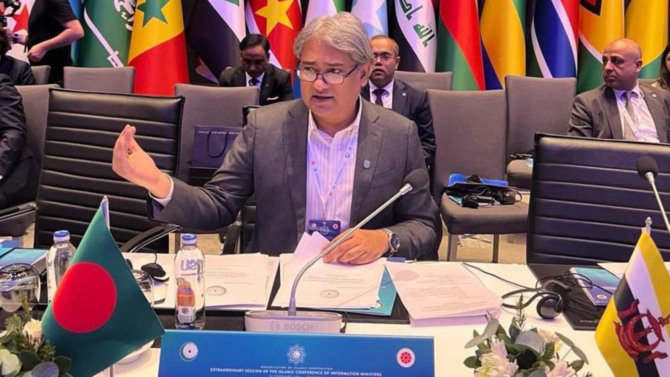DHAKA: Bangladesh’s state minister for information has proposed the Organization of Islamic Cooperation create a collaborative digital platform to combat Israel’s disinformation campaign against Palestine, as the Muslim grouping launches new plans to expose Tel Aviv’s war crimes.
Information ministers of OIC member countries were in Turkiye over the weekend for an extraordinary session discussing Israel’s disinformation campaign and attacks on journalists in Gaza, where nearly 30,000 Palestinians have been killed since October.
State Minister for Information and Broadcasting Mohammed Ali Arafat said Israel’s “despicable disinformation campaign” is an attempt to cover its blatant war crimes in Gaza, including the indiscriminate targeting of babies and children, as well as journalists and humanitarian workers.
“The world has hardly seen the continued killing of journalists and the spreading of disinformation as is happening in Gaza. I believe fighting to contain and combat against such dissemination of misinformation needs collective effort,” Arafat told the participants.
At least 88 journalists and media workers were among the tens of thousands of Palestinians killed in over four months since Israel began its onslaught on Gaza, according to the US-based Committee to Protect Journalists.
“We need to create a collaborative digital platform to combat the spreading of such disinformation against Palestine. I request the OIC Secretariat to prepare a plan in this regard immediately,” Arafat said.
Bangladesh is ready to support the OIC in establishing an information pool documenting Israeli war crimes that can be regularly shared with its member states, he added.
“Muslim Ummah must work together to stop this massacre and let the world know the truth. Bangladesh supports and stands firm by our Palestinian brothers and sisters in this dire situation.”
In a final communique, OIC information ministers condemned Israel’s “systematic misinformation campaigns” to “cover its brutality and genocidal massacres committed in the Gaza Strip.”
The 57-member organization also condemned Israel’s “systematic targeting of Palestinian journalists,” describing it as part of a campaign to “silence the voices of truth-tellers.”
The OIC said they are determined to collectively “counter and expose attempts by the Israel colonial occupation to cover up the destruction” in the besieged enclave, as they mandate the group’s media monitoring unit to establish an action plan to “lay bare and counter” the Israeli disinformation campaign at the international level.




















